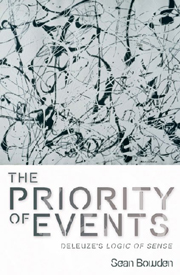Book contents
- Frontmatter
- Contents
- Acknowledgments
- Abbreviations
- Introduction: The Ontological Priority of Events in The Logic of Sense
- 1 The Stoics – Events and Sense
- 2 Leibniz – The Static Ontological and Logical Geneses
- 3 Lautman and Simondon – Problematic Ideas and Singularities
- 4 Structuralism – Structure and the Sense-Event
- 5 Psychoanalysis – Dynamic Genesis
- Conclusion
- Bibliography
- Index
1 - The Stoics – Events and Sense
Published online by Cambridge University Press: 12 September 2012
- Frontmatter
- Contents
- Acknowledgments
- Abbreviations
- Introduction: The Ontological Priority of Events in The Logic of Sense
- 1 The Stoics – Events and Sense
- 2 Leibniz – The Static Ontological and Logical Geneses
- 3 Lautman and Simondon – Problematic Ideas and Singularities
- 4 Structuralism – Structure and the Sense-Event
- 5 Psychoanalysis – Dynamic Genesis
- Conclusion
- Bibliography
- Index
Summary
The Stoics are of central importance to Deleuze's project in The Logic of Sense. As he writes in the Preface, the ‘privileged place assigned to the Stoics [in this text] is due to their having been the initiators of a new image of the philosopher which broke away from the pre-Socratics, Socratic philosophy and Platonism. This new image is already closely linked to the paradoxical constitution of the theory of sense’ (LS, xiii–xiv). So what is this image and how is it linked to Deleuze's theory of sense and the event?
In the ‘Eighteenth Series of the Three Images of Philosophers’, Deleuze understands the ‘image of the philosopher’ to be connected to a response to the Kantian question: ‘what is orientation in thinking? [qu'est-ce que s'orienter dans la pensée?]’ (LS, 127, translation modified). He distinguishes three such images – the Platonic, the pre-Socratic and the Hellenic – each of which has its own ‘axes and orientations’, its own ‘geography’ and ‘dimensions’ (LS, 127). In Plato, following Deleuze, the ‘philosopher's work is always determined as an ascent and a conversion, that is, as the movement of turning toward the high principle (principe d'en haut) from which the movement proceeds, and also of being determined, fulfilled, and known in the guise of such a motion’ (LS, 127). Indeed, it is well known that, for Plato, not only does knowledge of worldly things in general involve an apprehension of the transcendent Forms or Ideas in which these things ‘participate’, but what is more, the ‘philosopher’ is distinguished and known per se precisely in so far as he or she contemplates the Ideas.
- Type
- Chapter
- Information
- The Priority of EventsDeleuze's Logic of Sense, pp. 15 - 55Publisher: Edinburgh University PressPrint publication year: 2011



